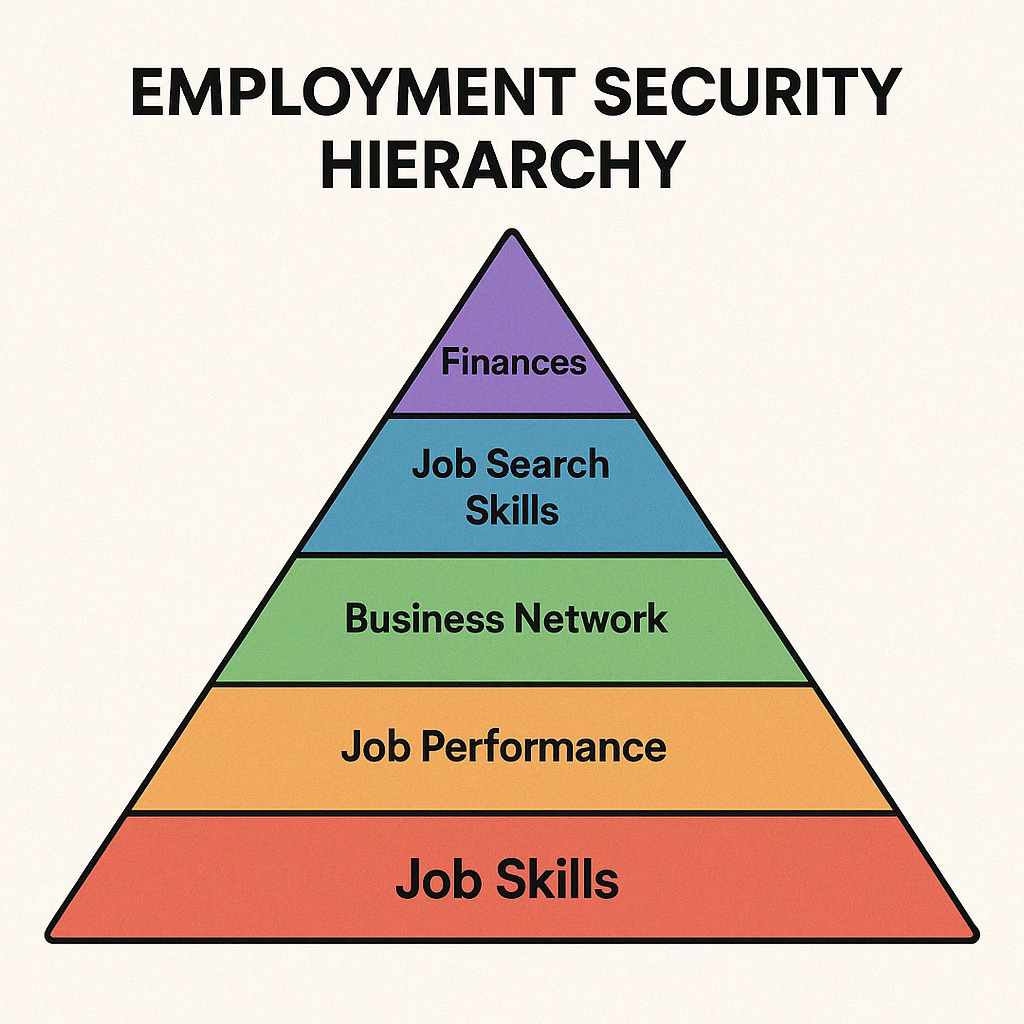
Perhaps the most famous “hierarchy” is Maslow’s Hierarchy of Needs. That pyramid that builds from a base and then advances up the pyramid from the base. The hierarchy is an extremely useful tool for thinking about Employment Security.
Every hierarchy has a base -- and without the base, you cannot move up the pyramid. And if you are at the pinnacle of the hierarchy and something is taken away from you at the base or any level below where you are on the pyramid -- like when you are laid off from your job -- you go right back to the base of the hierarchy and re-solve the issues to get you moving from the base to the pinnacle.
Likewise, what something means at a certain hierarchy level changes over time; what is considered “secure” when you are single, in a job, and without obligations is very different than when you are married, have a home, children, and a thriving social network of friends and family. In other words, you’ll need to revisit each level of the hierarchy over time to build on what is needed at that level and prioritize what you need to do to get it.
Or, in another way, you can look at a hierarchy; each level has a definition of success.
This is how it works for our career, isn’t it? We start off with a base of skills and build on those skills over time. Over time, the required skills for success change, requiring us to revisit our job skills and prioritize what needs doing to stay current in our skills.
But, enough of the coolness of the model. So let’s take a look at The Employment Security Hierarchy in one picture:
In this hierarchy, Job Skills form the base -- the skills you need to acquire to do a job. Without the skills to do project management work or the skills to do the work of a nurse in a hospital, you’ll never get a job.
Once you have some job skills and a job, you’ll need to have a performance level that shows that you are successfully using your job skills to do your work. If you have good job skills and good Job Performance, your chances of getting a decent job will rise. This level of the hierarchy, by the way, is where most career coaches stop when they talk about staying employed -- this is where job security is located, but not Employment Security. Having skills and performing well, job security is yours - until you get laid off, your company is sold, or goes bankrupt. That is where Employment Security starts.
By using your job skills and performing well on the job, you’ll build up contacts in the business world—people who can help you with your work and who can help you with theirs. This Business Network will also help you find new jobs inside and outside the company where you are currently working.
Moving up the hierarchy brings us to Job Search Skills. Fifteen years ago, we didn’t need to worry too much about job search skills: you looked in the newspaper or the nascent Internet for jobs, wrote standard resumes, did some interviews, and you got the job. Pretty straightforward.
That isn’t the case today; we compete to show our value for the work with everyone else on the planet. We must competitively show why we are right for the next job over everyone else. It’s a skill because we don’t do this every day, this search for a job, yet in terms of landing the next job, it is the most important set of skills to obtain. Yet, if we don’t have the job skills, performance on the job, or a business network to find out about opportunities, we’ll never have a chance to show off our great interviewing skills.
At the top of the hierarchy is Finances. Until this point, it might be obvious that what is on the hierarchy applies to our work in one form or another. Maybe not presented like this, but at least you know that you need to conduct a job search to find another job, even if you didn’t have a Cubicle Warrior skill level. But finances?
In my opinion, your finances are the final link to getting to Employment Security. Robust financial resources give you choices. Financial resources help you turn down bad jobs with bad bosses in a bad corporate culture, so you don’t get into a position where you have to do everything -- from compromising your values to ruining relationships -- to keep a job you didn’t want with a manager you can’t stand.
Tomorrow, I’ll examine each of these areas of the hierarchy—what they mean, how they fit into the overall hierarchy, and what is needed for success at each level. We’ll start at the base - Job Skills.
Be a Cubicle Warrior,
Scot
This newsletter focuses on helping knowledge workers navigate corporate America, from searching for jobs to working in the role, having employment security, and helping you become a Cubicle Warrior.
Navigating Corporate is a reader-supported publication. There are no investors. No sugar daddies. Just me. And the cats.
To receive new posts, become a free or paid subscriber.



